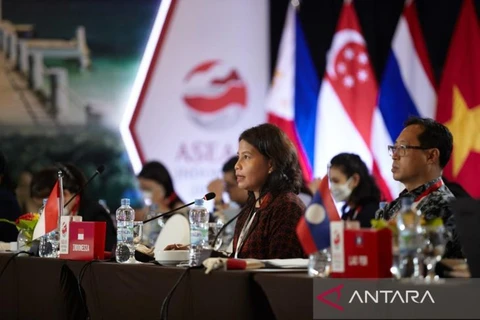Hanoi (VNA) – Leaders of the Association of Southeast Asian Nations (ASEAN) recently declared to advance regional payment connectivity and promote local currency transactions.
According to a Google, Temasek and Bain & Co. report, ASEAN’s booming digital payment market is expected to hit 2 trillion USD by transaction value in 2030.
Recognising the potential benefits of using local currencies, they emphasised the importance of strengthening financial resilience, deepening regional financial integration, and bolstering regional value chains.
To achieve these goals, ASEAN leaders pledged to leverage emerging opportunities brought by innovation to facilitate seamless and secure cross-border payments, taking into account the unique circumstances of each country.
In the process, technology is pivotal in advancing regional payment connectivity within ASEAN by enabling faster, cheaper, safer, transparent, and inclusive cross-border payment systems and services using local currencies.
Using quick response (QR) codes, mobile applications, and digital platforms enhances the efficiency and convenience of local currency transactions among ASEAN countries.
It also supports developing and integrating local currency markets, improving liquidity, market access, and harmonising payment infrastructure and standards.
ASEAN countries are making significant strides in regional payment connectivity and the promotion of local currency usage. Indonesia, Singapore, Malaysia, Thailand, and the Philippines have signed a Memorandum of Understanding, prioritising cross-border payment systems, local currency settlement frameworks, digital payment platforms, and financial inclusion.
Moreover, countries such as Brunei, Cambodia, Indonesia, Laos, Malaysia, Myanmar, Philippines, Singapore, Thailand, and Vietnam have implemented bilateral local currency settlement frameworks based on the ASEAN Guideline.
The State Bank of Vietnam and the Bank of Thailand have jointly launched QR payment services for cross-border transactions.
Additionally, Bank Indonesia and the Monetary Authority of Singapore collaborate on a cross-border QR payment linkage to further enhance payment connectivity across ASEAN.
These initiatives leverage QR codes, mobile applications, and digital platforms to improve cross-border transactions’ efficiency, security, and convenience.
ASEAN leaders have also agreed to promote using local currencies for cross-border transactions within the region. This move aims to reduce reliance on major international currencies, enhance financial stability, and avoid potential spillovers from global crises.
To advance regional payment connectivity, ASEAN leaders agreed to establish a Task Force responsible for studying the feasibility, benefits, challenges, and modalities of implementing the ASEAN Local Currency Transaction Framework.
The Task Force will develop a draft framework that provides guidance and recommendations for promoting local currency usage in cross-border transactions.
Established in May, it is expected to submit its report and draft framework by the end of 2024. The framework should be comprehensive and practical, considering the varying levels of development, readiness, and capacity among ASEAN countries./.
According to a Google, Temasek and Bain & Co. report, ASEAN’s booming digital payment market is expected to hit 2 trillion USD by transaction value in 2030.
Recognising the potential benefits of using local currencies, they emphasised the importance of strengthening financial resilience, deepening regional financial integration, and bolstering regional value chains.
To achieve these goals, ASEAN leaders pledged to leverage emerging opportunities brought by innovation to facilitate seamless and secure cross-border payments, taking into account the unique circumstances of each country.
In the process, technology is pivotal in advancing regional payment connectivity within ASEAN by enabling faster, cheaper, safer, transparent, and inclusive cross-border payment systems and services using local currencies.
Using quick response (QR) codes, mobile applications, and digital platforms enhances the efficiency and convenience of local currency transactions among ASEAN countries.
It also supports developing and integrating local currency markets, improving liquidity, market access, and harmonising payment infrastructure and standards.
ASEAN countries are making significant strides in regional payment connectivity and the promotion of local currency usage. Indonesia, Singapore, Malaysia, Thailand, and the Philippines have signed a Memorandum of Understanding, prioritising cross-border payment systems, local currency settlement frameworks, digital payment platforms, and financial inclusion.
Moreover, countries such as Brunei, Cambodia, Indonesia, Laos, Malaysia, Myanmar, Philippines, Singapore, Thailand, and Vietnam have implemented bilateral local currency settlement frameworks based on the ASEAN Guideline.
The State Bank of Vietnam and the Bank of Thailand have jointly launched QR payment services for cross-border transactions.
Additionally, Bank Indonesia and the Monetary Authority of Singapore collaborate on a cross-border QR payment linkage to further enhance payment connectivity across ASEAN.
These initiatives leverage QR codes, mobile applications, and digital platforms to improve cross-border transactions’ efficiency, security, and convenience.
ASEAN leaders have also agreed to promote using local currencies for cross-border transactions within the region. This move aims to reduce reliance on major international currencies, enhance financial stability, and avoid potential spillovers from global crises.
To advance regional payment connectivity, ASEAN leaders agreed to establish a Task Force responsible for studying the feasibility, benefits, challenges, and modalities of implementing the ASEAN Local Currency Transaction Framework.
The Task Force will develop a draft framework that provides guidance and recommendations for promoting local currency usage in cross-border transactions.
Established in May, it is expected to submit its report and draft framework by the end of 2024. The framework should be comprehensive and practical, considering the varying levels of development, readiness, and capacity among ASEAN countries./.
VNA























